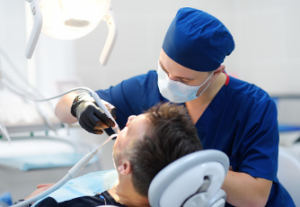Emergency dentists treat various dental emergencies, such as cracked teeth, knocked-out teeth, lost fillings and excruciating dental pain.
Treat the pain and swelling caused by broken or chipped teeth promptly, as these issues could lead to severe consequences if not taken care of immediately.
-
 Broken or Chipped Teeth
Broken or Chipped Teeth
Chipped or broken teeth can be painful and cause swelling in the gums. Left untreated, these conditions could lead to infection and further tooth damage.
You should see an emergency dentist immediately if you notice a chipped or broken tooth. Emergency dental treatment can prevent further harm and save the tooth even if there isn’t any pain or bleeding.
Your dentist has several treatments to fix a chipped or cracked tooth. Depending on the severity of the break, these may include dental bonding, veneers, or crowns. But, again, the severity of the break will determine which option is most suitable for you.
- Swollen or Infected Gums
Swollen or infected gums can indicate various dental issues. Hence, it’s essential to visit your dentist when you notice these symptoms so they can identify the source and suggest a course of treatment.
Gingivitis is a condition that causes swollen and red gums that often bleed when you brush or floss. Fortunately, it’s usually mild in its early stages and can generally be controlled with daily teeth-strengthening toothpaste like periodontal – 3x more effective at eliminating plaque than other toothpaste.
Untreated bacterial infections can progress into abscesses and pockets of pus. Abscesses have the potential to grow into teeth themselves, so if you experience any swelling of the gums and discomfort, you must contact an emergency dentist North Shore right away.
An abscess can be incredibly painful, and the swelling makes it difficult to speak or eat. Unfortunately, this infection can also spread throughout your body, leading to systemic disease.
You can reduce swelling with an oral rinse from a 3 per cent hydrogen peroxide solution. A cold compress or ice cube may also be applied to the affected area to reduce discomfort and pain.
- Toothache
A toothache is a sign that something is wrong with your teeth. The pain may be mild or intense, depending on what’s causing the issue.
Healthy teeth have a protective layer of enamel around their nerve endings, but this can be damaged or worn away over time if there’s damage to or wear to this layer. When this occurs, pain typically stems from pulp inflammation (pulpitis).
You might also experience pain from another area of your mouth, such as your jaw or ear. If the discomfort is intense or has persisted for more than 24 hours, you should seek emergency dental attention.
A cold compress can reduce inflammation and swelling, providing temporary relief. You could also try placing a cotton ball with peppermint oil onto the affected tooth for quick comfort.
- Fever or Bleeding
Fever or bleeding from the mouth is a warning sign that an emergency dentist should be consulted immediately. An experienced emergency dentist North Shore can diagnose and treat the problem, relieving pain and discomfort.
Infected or abscessed teeth can be extremely dangerous and lead to other oral health complications that could be life-threatening. In addition, an abscess can spread to neighbouring teeth or the jaw if left untreated. Signs of an abscessed tooth include fever, a foul taste in the mouth, pus, swollen glands and tender lymph nodes.
Suppose you are suffering from a high fever or sharp, stabbing pain in the gums that won’t go away despite taking over-the-counter medications. In that case, emergency dental care should be sought immediately. Other signs to look out for include difficulty breathing or swallowing, swollen face, and fever that won’t go down or stay below 100 degrees F.
Emergency dentists usually glance at the patient’s mouth to diagnose the source of their discomfort. Then, depending on the situation’s seriousness, they may perform a treatment procedure or refer them to a general dentist for further work.
- Abscess
An abscess is an infected area on the body that can spread infection and threaten other parts. Therefore, seek emergency dental care immediately if you detect any warning signs of an abscessed tooth.
Several factors, including cracked teeth, periodontal disease and recent dental procedures like extractions or implants, can cause an oral abscess. In addition, the swelling and pain accompanying an abscessed tooth make it challenging to speak, eat or breathe normally – so visit an emergency dentist immediately for treatment.
The initial step in treating a dental abscess is draining the pus. An emergency dentist will perform this procedure by cutting a small hole in the abscessed tooth and removing its
An abscessed tooth can be painful and cause you to miss work or school, but it is best to get treated by a dentist as soon as possible to drain the infection and allow your tooth to heal correctly.